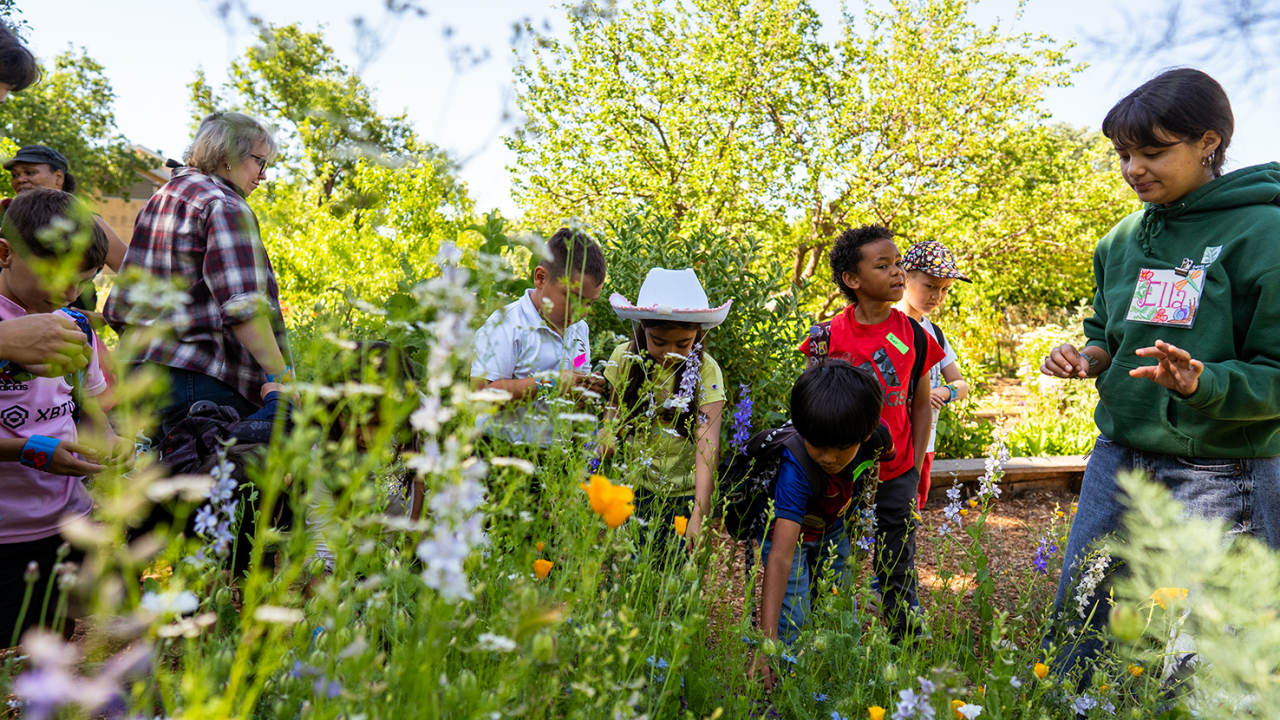
Kids in the Garden: UC Davis Students Teach Lessons in Food, Plants and Nature
Program Brings Children to Campus for Fun and Educational Activities
Under a canopy of trees, young kids dig for worms in a compost bin on campus. Their little dirt-covered fingertips gently pluck out one they think will be speedy enough to win a “worm race.” Led by UC Davis students, this hands-on activity shows kids how worms play an important role in healthy soil and plant growth. It's just one of many fun lessons in the Kids in the Garden program.
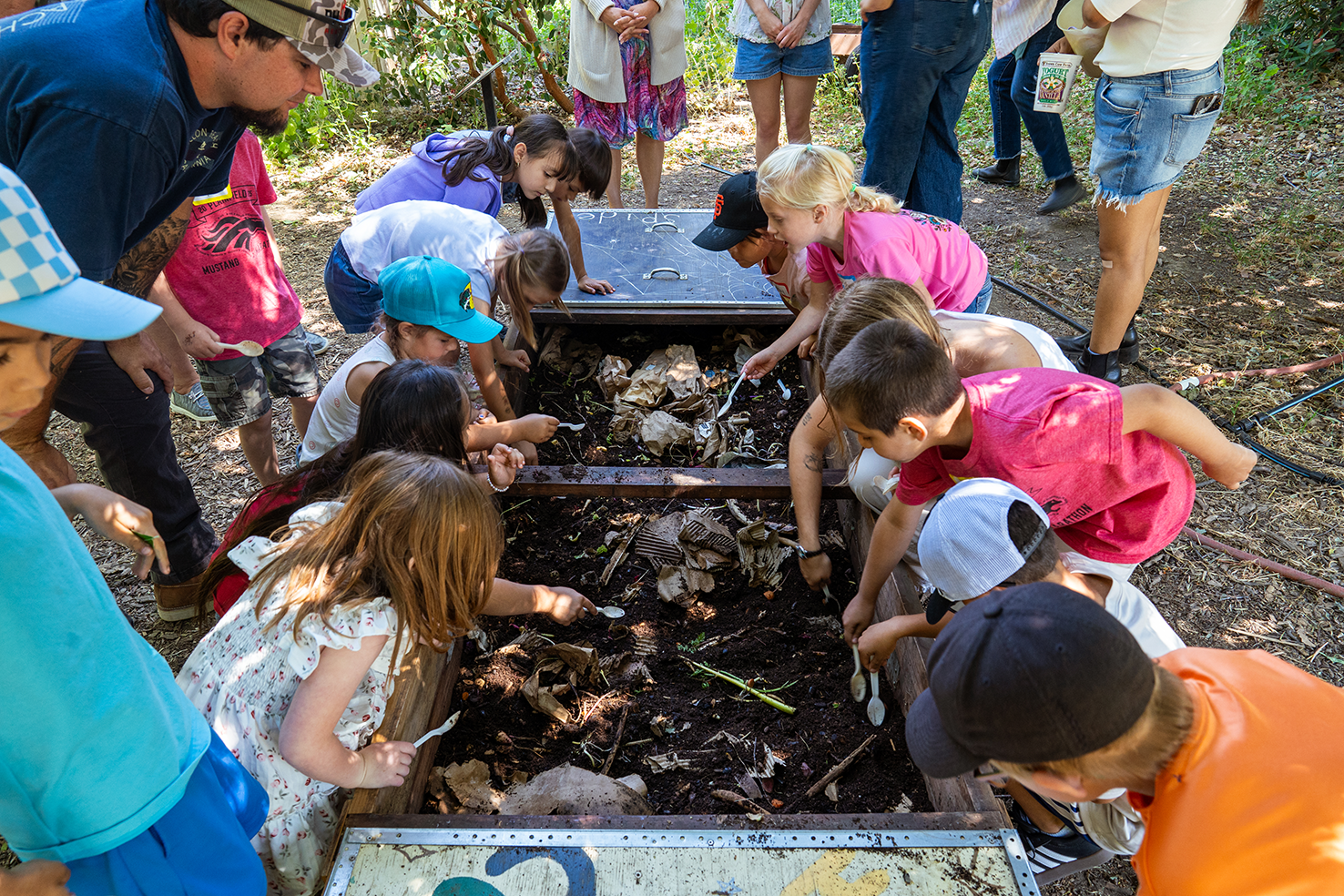
The two-quarter course and internship program gives students a chance to serve as field trip educators for K–6 elementary school groups that visit the Ecological Garden and Student Farm. Students prepare for this role by taking the winter course, PLS 193: Garden and Farm-Based Experiential Education Methods, where they receive direct experience in agricultural and environmental education. Through hands-on learning, participants gain both ecological understanding and practical teaching skills needed to engage children in a garden setting. By spring, they're ready to lead field trips with support from program coordinator Lexie Nelson. She says the program benefits both groups of students: the UC Davis students gain hands-on experience in teaching, communication and leadership, while the younger kids enjoy a fun, outdoor introduction to where food comes from and garden ecosystems.
“The thing about this program is, it's as much of a learning opportunity for the college students as it is for the elementary students,” Nelson said.
The half-acre Ecological Garden is cared for by students year-round and includes a variety of plants and systems such as vegetables, herbs, fruit trees, native plants and composting areas. Nelson said kids get a full sensory experience during their field trip to campus. They dig in the soil, smell herbs, taste fresh veggies and get an up-close look at the world of plants and gardens.
“The act of walking into the garden, harvesting, washing veggies, putting them on your plate, and eating it, is a magical experience for kids that get them to try vegetables that they never would before,” Nelson said.
Nelson and her students choose the fun activities to lead while covering an array of topics, including native plants, insects and pollinators, composting and soil health and growing organic food.
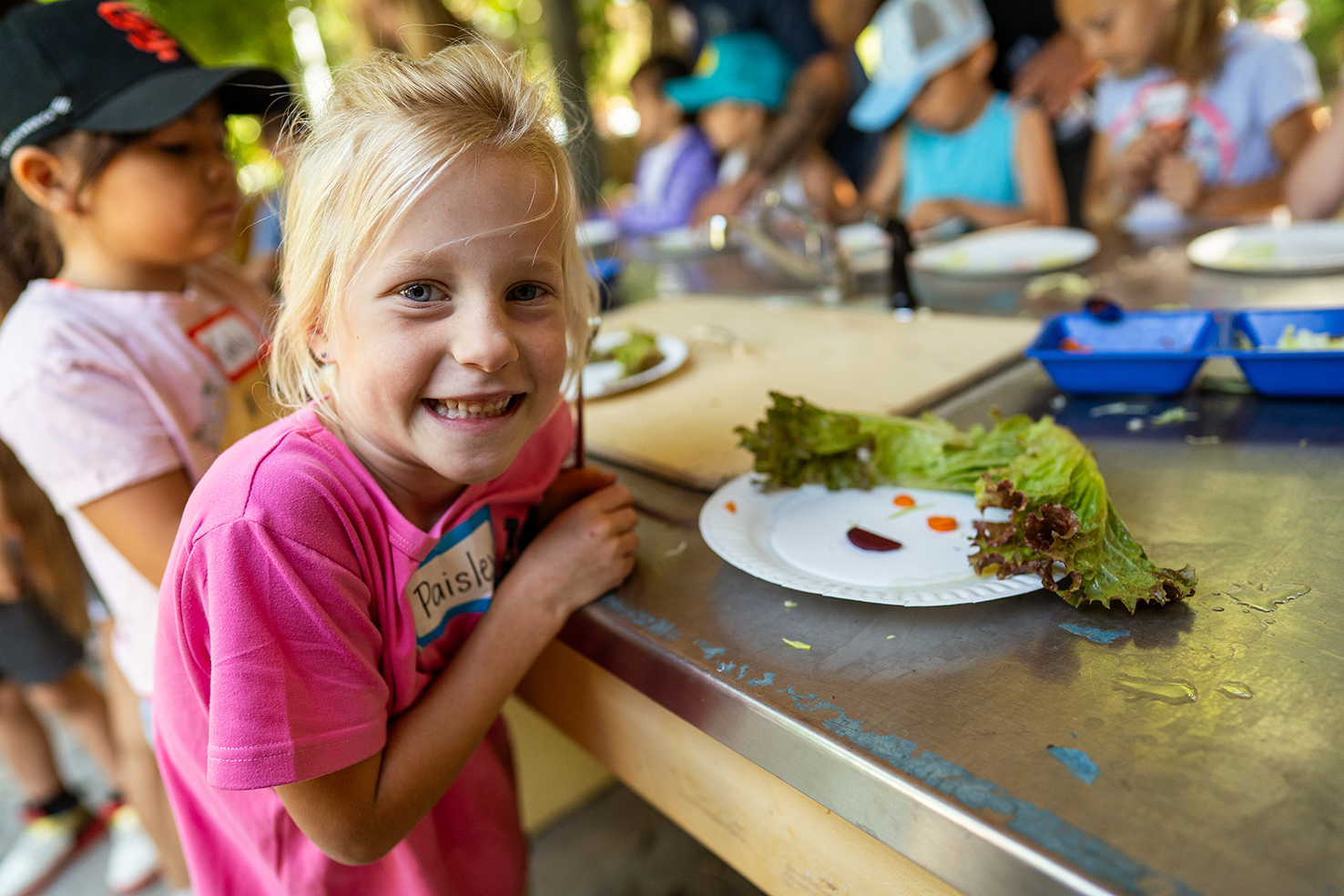
Tasty veggie face plates
One recent morning, the UC Davis field trip guides hosted 27 second graders from Marguerite Montgomery Elementary School in Davis and 22 kindergarteners from Plainfield Elementary School in Woodland. The kids were divided into small groups and toured the grounds through four different activity zones.
“Who’s ready to be a farmer today?” asked Jasmine Granados, a senior majoring in agricultural and environmental education, who chatted with the kids about the ways some fruits and vegetables are grown on campus. She was sure to keep it informative, yet understandable for their age.
“They might not know that their food is in soil, they might not know what this vegetable is,” she said. “So, how can we connect with them and really make that ‘a ha’ moment? We want to create that connection, create that love for the garden.”
To help make that connection, she walked the kids over to a small lettuce plot, where they each handpicked a leaf of lettuce. “Get out your crab claws,” Granados instructed, showing them how to pinch the stalk using their pointer fingers and thumbs.
They used the fresh lettuce to make a “veggie face plate” with carrots, beets, radishes and kohlrabi. Granados told the kids they could taste the produce and offered some homemade dressing (made of olive oil, vinegar, honey and salt) to dip it in. Granados said she enjoys seeing them get excited to try something new.
“Everybody ate their vegetables,” Granados said. “I was asking them, ‘What was your favorite vegetable?’ Everyone said at least one they liked, even beets and the kohlrabi. That made me so happy.”
Flower power
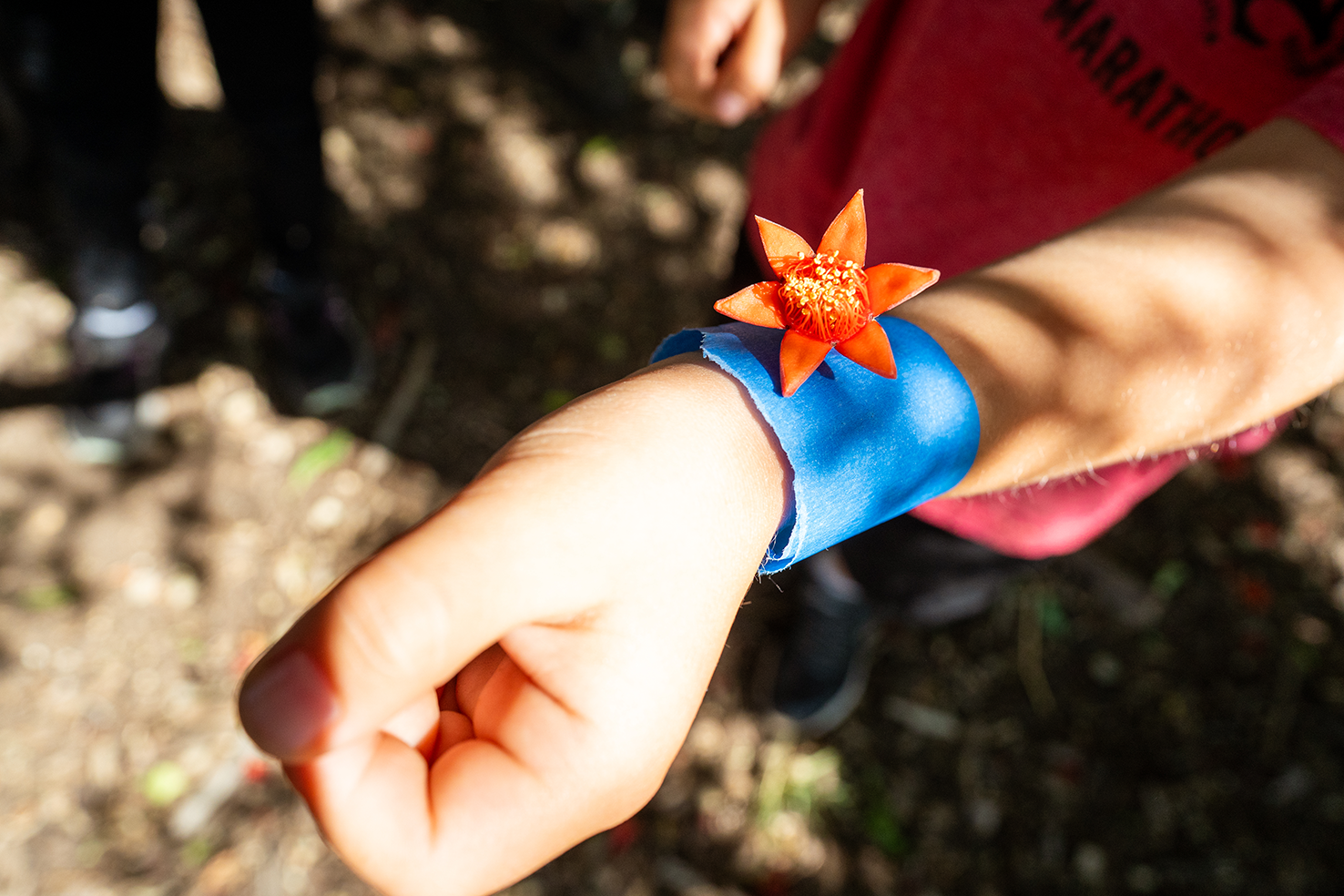
Another activity involved making flower bracelets. The guides wrapped sticky tape around the kids’ wrists and they each collected flowers and leaves from all sorts of plants, including bright red flowers from a pomegranate tree with low hanging branches.
As the kids walked down a path, they stopped to smell rosemary and then picked a piece to add to their bracelets. They also checked out an herb called wormwood and learned about lemon balm, a perennial herbaceous plant in the mint family with lemon-scented leaves. The last stop brought them to a patch of vibrant and fragrant violet plants. Not only did the children have a colorful and fragrant new bracelet to bring home, they also picked up fun facts about flowers and herbs along the way.
Off to the worm races
After learning about plants and harvesting, the kids moved on to one of the most thrilling parts of the day – composting and “worm races.” They gathered around a large wooden bin that, when guides opened the top doors, revealed a whole world filled with soil and decomposing organic material. The kids used plastic spoons to gently dig through the dirt in search of tiny critters. They spotted wriggling worms, spiders and centipedes, all helpful members of the garden ecosystem that thrive in and around the compost pile.
When they found a worm they liked, nearby picnic tables became the stage for “worm races.” The worms were placed on laminated papers with tracks drawn on them, ready to race. “I got my racer,” said one little voice among the group. “Its name is Long-y.”
“We have several activities focused on composting and soil, highlighting their vital role in supporting healthy plant growth and nutrient dense foods,” Nelson said. “Many kids have heard about composting, but seeing it in action, especially with the worms, really brings the concept to life in an engaging and memorable way.
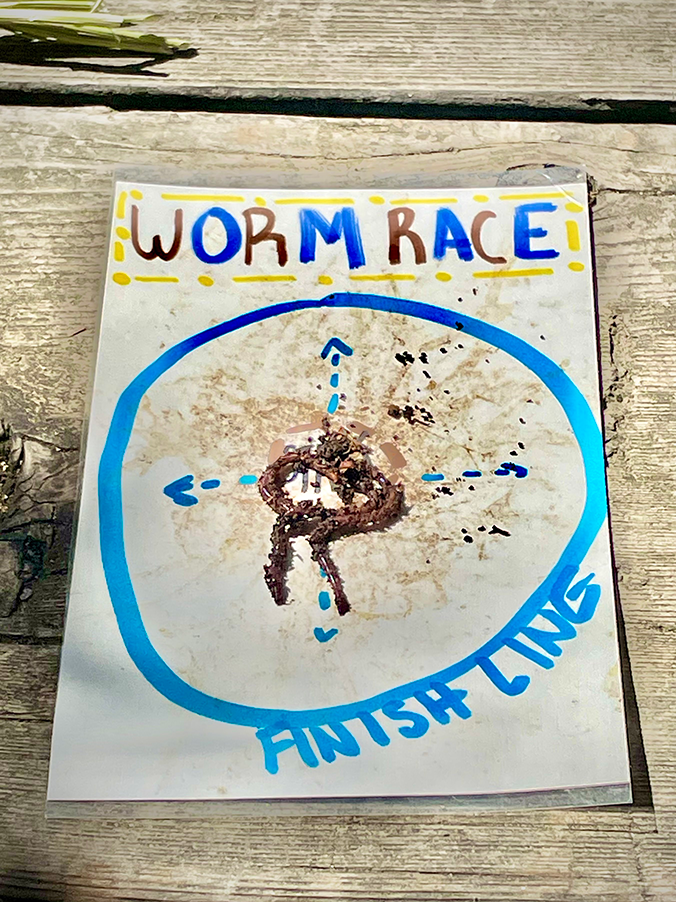
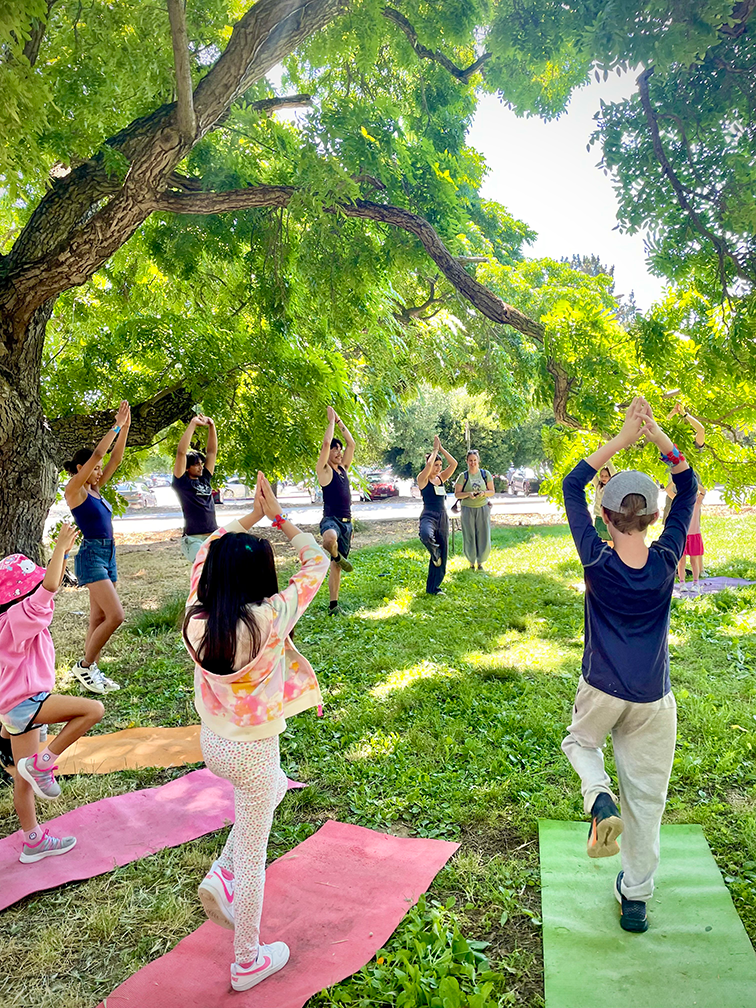
Yoga in the garden
On a grassy area near the Student Farm, colorful mats formed a circle under tall, lush green trees that provided plenty of shade as the kids settled in for garden yoga. Led by the UC Davis guides, the group began with gentle breathing exercises. The kids moved through a variety of poses, including garden-themed ones like tree pose and cobra pose (because, as they learned, snakes can sometimes be found in a garden).
Ronnie Landesman, a first-year community and regional development major, helped lead the session. “I love connecting the garden aspect to it and making a tree pose or being a bird, and they love it too,” she said. “And being outside is always nice. It’s the perfect way to start my day too.”
Landesman asked the kids to share their favorite yoga moves. One young boy declared, “banana peel,” which brought giggles from the group, but Landesman was ready to give it a try.
“That's my favorite part too,” she said. “They crack jokes; they are so hilarious.”
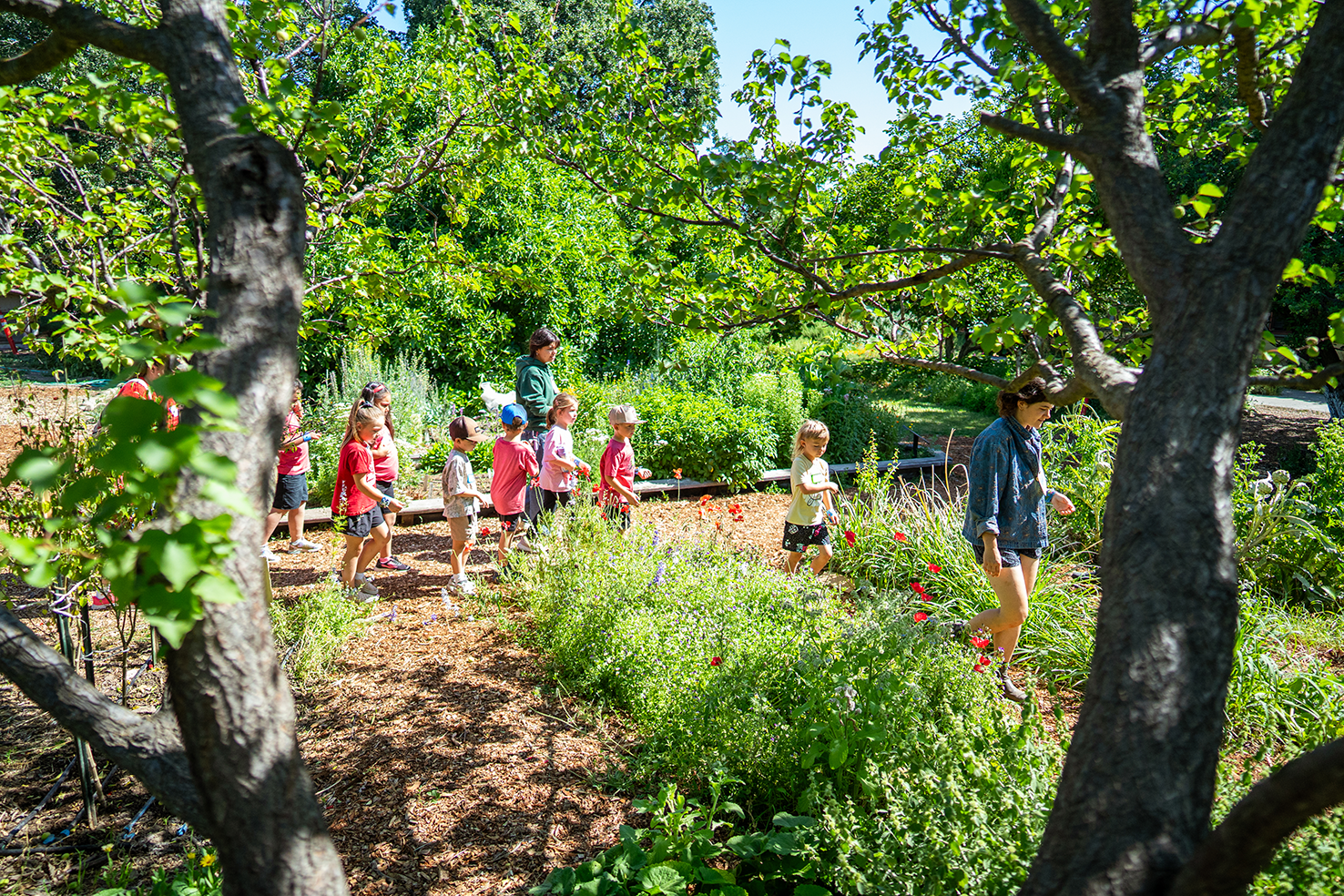
Curiosity leads the way
The kids got a surprise lesson this day when they spotted big pipevine swallowtail caterpillars crawling and munching on nearby plants. The UC Davis students quickly shifted gears, setting aside their prepared lesson to share everything they knew about the mesmerizing insects with plump black bodies with bright orange spots. They explained how the caterpillars would soon transform into butterflies, some of which were even seen fluttering overhead.
Nelson said she welcomes moments like this, where everyone follows their curiosity, making the experience unforgettable. “What I hope for the children is to have something that they take away and remember, something they go home and share with their family, if it’s pulling a carrot from the ground, sitting quietly under the fig tree, or discovering an herb they like,” Nelson said. “I want them to feel a sense of wonder and belonging in the natural world.”
For the UC Davis students, Nelson hopes they try new things, push themselves in meaningful ways and connect what they learn in this program to their lives beyond the garden. “It's so great to watch them develop over the course of the quarter and find their educator voices and what works for them with group management styles and engaging kids in meaningful ways,” Nelson said. “It's been really wonderful to watch that and I hope the knowledge and skills they have cultivated here stay with them and continue to influence their paths moving forward.”
Kids in the Garden is primarily overseen by the Agricultural Sustainability Institute, which is housed within the College of Agricultural and Environmental Sciences.
Over the years, the Oki Family Foundation has sponsored field trips for some local schools that otherwise wouldn’t be able to bring kids to campus, which aligns with its commitment to supporting youth education in agriculture and environmental sustainability.
Media Resources
- Lexie Nelson, Agricultural Sustainability Institute, llnelson@ucdavis.edu
- Tiffany Dobbyn, College of Agricultural and Environmental Sciences, tadobbyn@ucdavis.edu